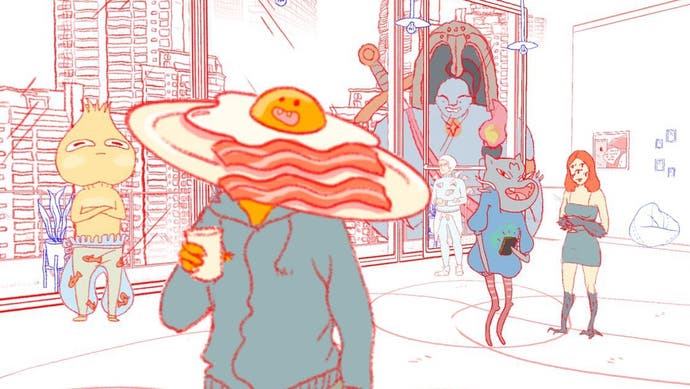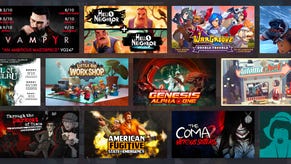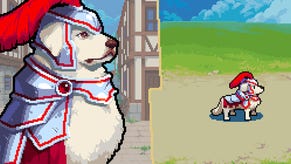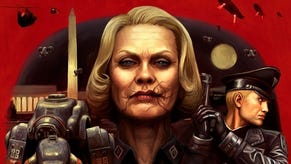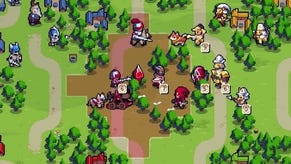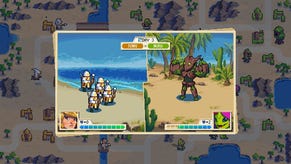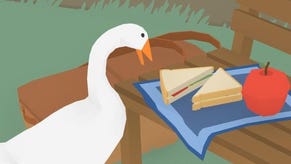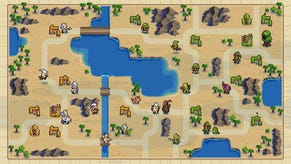EGX 2018: The best games from this year's show
The team at Eurogamer picks its highlights from a lovely weekend in Birmingham.
Another year, another EGX done and dusted! Among the many highlights was a live Arcadia Baes panel, a behind-the-scenes look at Destiny's end-game destination and some brand new Sunless Skies announcements, and whether you caught the show in person or online, we hope you had a lovely time.
There were of course many, many games to play from both big publishers or in Leftfield Collection and Rezzed areas, and we wanted to compile a list of our favourites.
As with previous years, this isn't a definitive list, but a personal selection of games from the team at Eurogamer as we roamed the show, and will hopefully serve as something to keep an eye out for in the coming months.
Hypnospace Outlaw
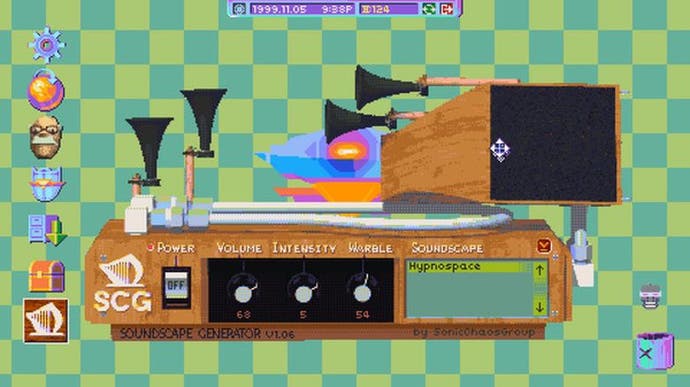
I didn't realise how nostalgic I was for the early days of the internet - the auto-playing midi files, colourful bouncing GIFs and the heavily-compressed videos reminiscent of Microsoft Encarta - until I gave Hyperspace Outlaw a browse.
This convincing simulation of an early 90s operating system has an intriguing premise - it's your job to police this alternative reality internet from rogue users posting problematic content, from the copyright infringement of cheesy cartoon characters to crawling through page indexes to find secret sites littered with harassment, literally stamping out offending articles as you go.
Though its the garish Winamp skins and snaking mouse cursor trails which suck you in with a powerful vortex of nostalgia, it's understanding what makes this bizarre world tick that keeps you clicking away. The virtual currency paid by your (probably sinister) employers for helping keep Hypnospace safe from online miscreants doesn't hurt, either. - Matthew Reynolds
Wargroove
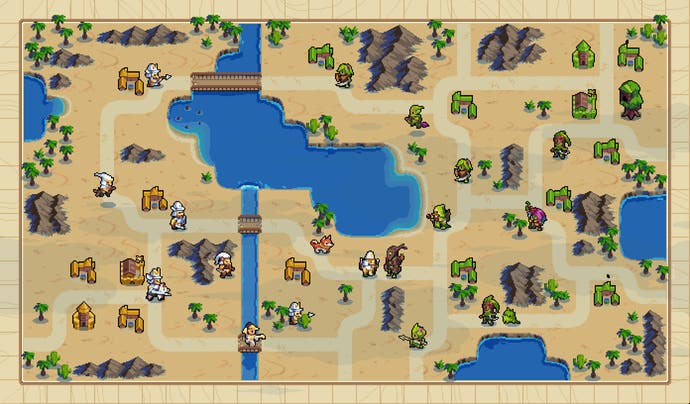
Wargroove is a pretty shameless rip-off of Advance Wars - and that's why I love it. It's been over a decade since the last Advance Wars came out (2008's Days of Ruin for Nintendo DS). If Nintendo's not going to bother, good on the developers at Chucklefish for scratching that itch. Everything from the art style to the way the units fight each other is lifted from Nintendo's currently-dormant series. The difference is it's all wrapped in a medieval skin. Sure, there are some subtle differences, but, honestly, Wargroove is medieval Advance Wars. It's that simple.
At EGX I played the game on a Nintendo Switch, two Joy-cons slotted into the console and held aloft. I played the fifth campaign mission, which charged me with extracting five refugees from one point of the map to another, all the while fending off the advancing forces of the enemy. My strategy involved building wagon units, which move great distances per turn - particularly on road tiles - and using them to pick up the refugees, while producing as balanced a defensive force as possible. I found decent sniper positions for my archers behind a wall, and enjoyed landing a critical strike with my knight (it triggers when you hit an enemy at the farthest movement range point, kind of like a charge). I was not supposed to defeat all the enemies the game throws at you in this mission. Rather, it was about surviving long enough to get the refugees and your commander off map. At the end, I was swarmed. Things got a little desperate!
Playing Wargroove on Nintendo Switch rekindled memories of pumping hundreds of hours into Advance Wars on Game Boy Advance over 15 years (15 years!) ago. Wargroove is a multiplatform game, but the Nintendo Switch is its spiritual home. I can see it doing very well there. - Wesley Yin-Poole
Hamsterdam
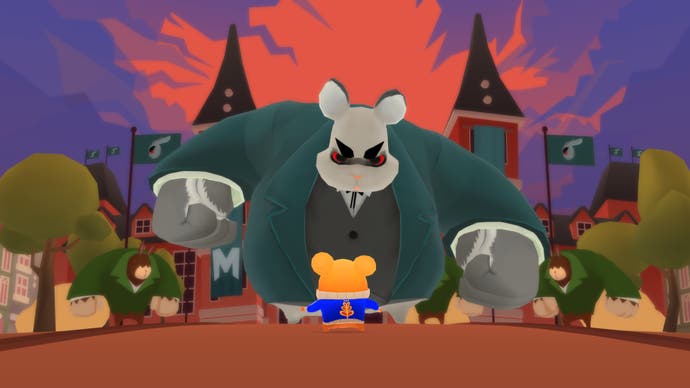
I've never been to Amsterdam, so from looking at this game I'm guessing it's full of cute furry animals and absolutely nothing untoward. Right?
Hamsterdam is the most kawaii brawler you'll ever encounter, and is coming to mobile devices, Switch and Steam in March 2019. Inspired by an episode of The Wire, Hamsterdam started life as a pet project by developer Muse Games, and the joy they experienced in making it really comes across in the game. It's fast-paced, colourful and really, really cute.
The story goes like this: you play as a young hamster called Pimm, who lives in the pleasant town of Hamsterdam with his grandpa. Like most young rodents, Pimm prefers to spend his days on his skooter rather than practising his hamster-fu moves. But the town soon becomes overrun with vermin, and Pimm's talents are required to defeat an evil chinchilla thug called Marlo.
On a touchscreen, the gameplay feels simple but physically wonderful. Along with furious tapping to throw punches, you can get little Pimm to throw a weighty uppercut by swiping upwards, and block attacks from villainous rodents with a quick side-swipe. It goes beyond reactionary physical play, as you can also decide the order in which to knock out rats with your paws of fury.
There's also a nice sense of progression to get your teeth into: as you travel through Hamsterdam, you can liberate different sections of the city - including the seedier red light district (ooh-er). Pimm can also collect a variety of outfits which give him bonus stat boosts. Or you can just put a scuba mask on him because it looks adorable. That is also fine.
With its light-hearted gameplay, wonderfully cute artstyle and stellar pun collection, Hamsterdam really is the wheel deal. I look forward to getting my paws on it. - Emma Kent
Small Talk
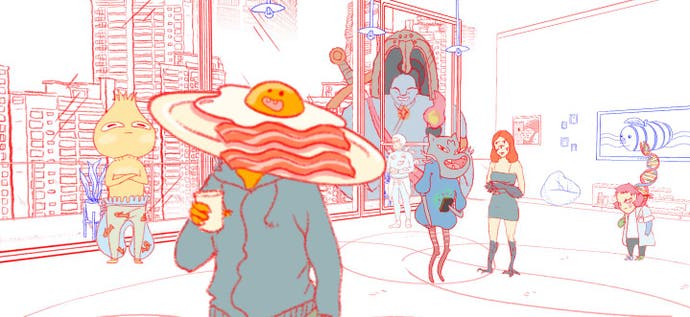
Small Talk takes place during a party during the end of the world, where everyone discusses their anxieties and self-doubts out in the open for you to hear.
Sounds pretty bleak, doesn't it? Well, not quite. For one, the partygoers aren't your usual archetypes - there's someone with half a dozen eyes, a person wearing goldfish bowl trousers and another with an entire plate of food for a head - and though their appearances are alien, their insecurities are very human.
Walking around the stark, beautiful crayon-outlined apartment offers all kind of musings from surprising characters, and by talking to the right people you'll be invited to explore their inner thoughts through expansive, other-worldly vignettes.
While the conversations are often short, this isn't the lighthearted chitchat you're probably used to, striking a heartfelt tone that makes an impact. - Matthew Reynolds
Disco Elysium
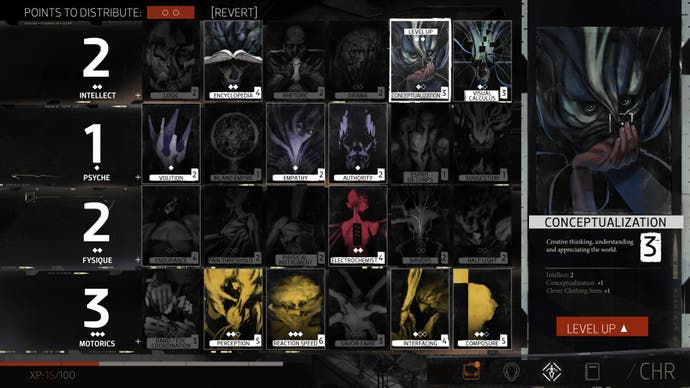
Playing Disco Elysium, a sort of cyberpunk board game meets point-and-click meets text-based adventure at EGX 2018, I was reminded of a few of my cultural touchstones. With its washed-up, substance-abusing detective who struggles to focus on a mysterious murder case, Disco Elysium immediately brought to mind the cyberpunk progenitors Blade Runner and Neuromancer - and all the associated tropes; after emerging from his trashed hostel room, Disco Elysium's protagonist is greeted by a sultry, smoking woman who you can try to chat up with a speech check (I failed, by the way).
Later, Disco Elysium reminded me of Frank Millar's groundbreaking graphic novel The Dark Knight Returns and its futuristic slang, when two kids, both of whom are perhaps on something, tell you to do one in a sharp, brain-piercing, off-kilter language. There's even the odd [censored] homophobic slur thrown in for extra edginess. I eventually left the kids to get on with the business of chucking rocks at the penis of a corpse hanging from a tree.
And finally, Disco Elysium reminded me of my favourite track by Ladyhawke. It is a game about mental fortitude, about logic, about electrochemistry and psychological skills, a game where your tie whispers in your ear, a game where your consciousness gives you hints. And yet underneath the brilliant writing and hard-to-pin down meaning is about as gamey an experience as you could want, a D and D adventure dressed in trousers found screwed up in a bath. As you progress you spend points on things like Motorics skills, Disco Elysium's take on the classic Dexterity and Perception stats. Here, though, these are your street smarts, boosting your ability to think on your feet, or, as the developer describes it: “above all, the Motorics skills make you cool.” Other skills twist and turn your hard-boiled detective's very being, warping his character and his soul. Too many points in Physique and you'll turn into a “violent animal”. Too many in Psyche and you're “Dale Cooper on MDMA”. Too many in Intellect and you're “a Holmesian pedant”. One of my tasks was to find a sad song to sing on-stage. Ladyhawke sings “stop playing with my delirium”, which may as well be the slogan of the game.
Disco Elysium is dripping with cool. It's refreshingly unique, with dialogue that stabs at your mind and a character development system that is more board game than video game. The demo at EGX left me wanting more, which is definitely a good sign. My only concern is it might be trying a bit too hard. Still, a real show-stopper. - Wesley Yin-Poole
What the Golf?

I feel like What the Golf is a puzzle game as much as it's a physics one, or a comedy one - or a golf one, for that matter.
It's the best kind of puzzle game, too. Short, snappy riddles that make you pause, then make you laugh, then give you the satisfaction of cracking it, another quick laugh, and onto the next. It's weirdly punchy. Hypnotic, even - a perfect showfloor game thanks to an uncanny ability to get you to sit down, get playing quickly and not want to stop, but also I reckon a perfect pick-up-and-put-down time killer too. A quick guffaw to kill loading screen time between rounds of something more serious maybe, or a couple chuckles over lunch.
The premise is pretty simple: it's like golf but every time you think you know what you need to do, it's something else. Draw back your club for swing only to see your little man catapulted down the fairway instead. Learn the feel of a basic football level in one stage and then on the next, when you think you've cracked it, suddenly you're flinging the goal frame itself down the pitch, GOAL GOAL, flashes the text when you successfully smash one into the other. There are some brilliant references - Superhot and Mario get the most blatant ones in the demo I played - but while they're smart, and make for nice variety, What the Golf is at its best when it's doing it's own thing: being devilishly funny.
It's visual comedy (the best kind, but also the kind that I really can do any justice with written words), but the developers at Triband, of Copenhagen, clearly have a sense of humour outside of just the physical - they scribbled some "quotes" on their stall endorsing the game, including such gems as "'I once made a game with similar mechanics' - A Not So Great Dev Guy". I have absolutely no doubt that they have another several dozen levels in them as funny as the selection I played.
What the Golf is great. It brings back memories of tinkering around with flash games back when they were cool, ICT lessons spent on Newgrounds and Miniclip and asking your mates how to work your way around the school intranet. It makes you feel like you can switch off your brain to blitz through on autopilot but still sort of get a puzzle-game workout as well. Most of all though it's just good, dumb fun, and I want more. - Chris Tapsell
Tick Tock
Tick Tock would have been the perfect game for Wii U. It's a spooky multiplayer puzzle game with a brilliant hook - that the game is played simultaneously on two screens, with half of the clues on one and half on the other. You'll need to play with someone else, then, and communicate what you're doing and seeing. So, while one player might see clues to a solving a puzzle they can't find, the other person would have the puzzle without the clues to solve it.
And while Tick Tock isn't coming to Wii U, it is coming to PC, Mac, Nintendo Switch, mobile and tablet platforms, and because each half of the game is played simultaneously, there's no technical hookups needed to stop each part of the game being a cross-platform experience.
One of the most impressive moments came late into the demo where you realise each of the areas around you are themselves places within a larger puzzle, made by fictional clockmaker Amalie Ravn, and the whole of the game so far can be twiddled with to progress. It's teasing stuff - the whole of the game has a sense that time is running out, with the sound of ticking clocks and organic-looking clock pieces and cogs, and there's a larger story going on too - an unseen clock counting the time you spend working out Tick Tock's puzzles.
At the demo's end, each player's screen amusingly explains you've wasted a certain number of minutes solving Tick Tock's puzzles. Intriguingly, the message then explains you've added the same amount of time to the life of Amalie Ravn, who's currently in peril. - Tom Phillips
Compiled by Matthew Reynolds.
